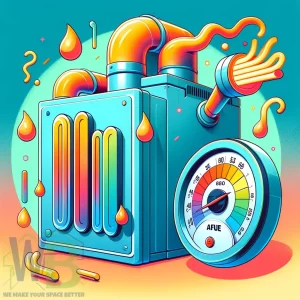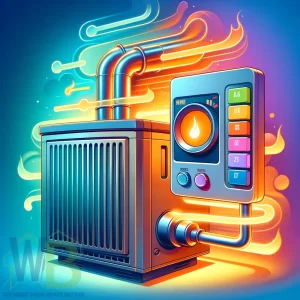Are you wondering if your heating system uses one or two fuel types? It’s important to know, as it affects how your system works and your energy bills.

Quick Summary
| Section | Key Points |
|---|---|
| Introduction | Overview of dual and single fuel heating systems and their importance in home heating. |
| How to Tell Which System You Have | Tips to identify if your system is single or dual fuel based on components, operation, and energy sources. |
| Dual Fuel Heating System | Explains dual fuel systems, combining an electric heat pump with a gas furnace, and how they switch based on temperature. |
| Single Fuel Heating System | Describes single fuel systems using one type of energy, with consistent heating method and simpler operation. |
| Single vs Dual Heating System | Comparison table highlighting differences in fuel types, efficiency, cost, and suitability for different climates. |
| Conclusion | Summarizes the benefits and considerations of each system, helping readers make an informed choice based on their needs and climate. |
How To Tell Which Fuel System You Have
To determine if you have a dual or single-fuel heating system, start by looking at what fuel it uses. If your system uses two fuel types, like an electric heat pump and a gas furnace, it’s a dual-fuel system.
This system switches between the two fuels to save energy and money, especially in places with changing temperatures throughout the year.
On the other hand, if your system only uses one fuel type, like electricity, gas, heating oil, or propane, it’s a single-fuel system.
Here’s a quick way to check:
- Look at the System: See if you have an electric heat pump and a gas furnace. If you do, it’s likely a dual-fuel system.
- Check Energy Bills: Your bills might show charges for both electricity and gas. This can be a sign of a dual fuel system.
- Ask a Pro: If you’re unsure, a heating system professional can tell you what kind of system you have.
How To Tell Which Fuel System You Have
Figuring out if you have a single or dual-fuel heating system is easier than you might think. Here’s how you can tell the difference:
Components:
- Single Fuel: This system uses only one kind of energy. It could be electricity, natural gas, heating oil, or propane. If you see just one of these fuels being used for heating, you have a single-fuel system.
- Dual Fuel: A dual fuel system usually has an electric heat pump and a gas furnace. The heat pump works when the weather is mild, and the gas furnace kicks in when it gets cold.
Operation:
- Single Fuel: If your system only has one piece of heating equipment, like a heat pump, furnace, or boiler, it’s a single fuel system.
- Dual Fuel: The heat pump and gas furnace work together in a dual fuel system. They switch between the two fuel sources depending on the cold outside. This helps the system use energy more efficiently.
Energy Sources:
- Single Fuel: It’s all about using one type of fuel – electricity, natural gas, heating oil, or propane.
- Dual Fuel: This system combines two fuel types: an electric heat pump and a gas furnace.
If you’re still unsure about what type of system you have, the best thing to do is talk to a professional who knows about heating systems. They can look at your system and tell you for sure.
What is a Dual Fuel Heating System?
A dual-fuel heating system is like having two systems in one. It combines an electric heat pump with a gas furnace. This combo gives you a flexible and efficient way to heat your home. Let’s break it down:
How It Works:
- Electric Heat Pump for Mild Weather: The electric heat pump is used when it’s not too cold outside. Heat pumps are great for mild weather because they move heat from outside to inside your home. They’re energy-efficient and can even cool your home in the summer.
- Gas Furnace for Colder Weather: The gas furnace takes over when the temperature drops and gets cold. Furnaces are better at heating your home in freezing conditions. They provide strong, reliable heat when you need it most.
The Switch:
- Automatic Changeover: The system automatically switches between the heat pump and furnace. It decides which to use based on the outdoor temperature. This means you always have the most efficient heating without doing anything.
Why It’s Great:
- Energy Efficiency: A dual fuel system is very efficient, using the most suitable energy source for different temperatures. This can mean lower energy bills and less impact on the environment.
- Comfort: You get the best of both worlds. Cool, efficient heating in mild weather and powerful warmth when it’s freezing.
- Flexibility: It adjusts to the weather, so you’re always comfortable no matter what the temperature is outside.
A dual-fuel heating system gives you an adaptable and cost-effective way to keep your home cozy all year round.
What is a Single Fuel Heating System?
A single-fuel heating system is more straightforward than a dual-fuel system. It uses just one type of energy to heat your home. Here’s what you need to know about it:
The Basics:
- One Energy Source: This system relies on a single energy type – electricity, natural gas, heating oil, or propane.
- Single Equipment: Unlike dual systems, a single fuel system has just one main heating unit. This could be a furnace, a heat pump, or a boiler.
How It Operates:
- Consistent Heating Method: The system uses the same method to heat your home, regardless of the weather. For example, if it’s an electric heat pump, it will be used both for mildly cold and very cold days.
- No Automatic Switching: Since there’s only one fuel source, the system does not need to switch between different heating methods.
Advantages and Considerations:
- Simplicity: These systems are simpler because they have just one type of heating equipment.
- Dependence on One Fuel: If the price or availability of the fuel changes, it can affect your heating costs and efficiency.
- Suitability: Choosing a single fuel system that works well with your local climate is important. For example, a heat pump might be great in milder climates but less effective in extremely cold areas.
In summary, a single-fuel heating system is all about simplicity and consistency. It uses one energy source and one type of heating equipment to keep your home warm.
Single vs. Dual Heating System
Comparing single and dual-fuel heating systems can help you understand which might be better for your home. Here’s a table to show their main differences:
| Feature | Single Fuel System | Dual Fuel System |
|---|---|---|
| Number of Fuel Types | Uses one type of fuel (electricity, gas, oil, propane). | Uses two types of fuel (typically electricity for the heat pump and gas for the furnace). |
| Heating Equipment | One main heating unit (like a furnace, heat pump, or boiler). | Combines an electric heat pump with a gas furnace. |
| Operation in Different Weathers | Same heating method regardless of weather. | Automatically switches between heat pump and furnace based on temperature. |
| Energy Efficiency | Efficiency depends on the type of fuel and equipment used. | Generally more energy-efficient as it uses the most suitable energy source for the temperature. |
| Cost-Efficiency | Can be cost-effective in areas where the chosen fuel type is cheaper. | Potentially lower operational costs due to energy-efficient operation. |
| Best Use Scenario | Ideal for areas with consistent weather patterns or where one fuel type is more economical. | Best for areas with varying temperatures, offering efficient heating in both mild and cold climates. |
| Complexity | Simpler, with less equipment to maintain. | More complex due to having two types of heating systems. |
Summary:
- Single Fuel System: Simplicity and consistency with one type of fuel and heating method.
- Dual Fuel System: Flexibility and efficiency using the most suitable fuel source for different weather conditions.

Conclusion on Single and Dual Fuel Heating Systems
Choosing between a single and dual fuel heating system depends on your home’s needs, local climate, and energy preferences.
Making Your Choice:
- Consider Your Climate: A dual-fuel system can provide the adaptability you need if your area experiences a wide range of temperatures.
- Think About Energy Costs: Dual fuel systems can be more energy-efficient, potentially saving you money on bills in the long run.
- Simplicity vs. Flexibility: Single-fuel systems are simpler but less adaptable, while dual-fuel systems offer more control and efficiency in different weather conditions.
Ultimately, the decision comes down to what works best for your situation. Single and dual-fuel systems have advantages, so consider what comfort, cost, and climate matters most.
By understanding the differences and benefits of each system, you’re now better equipped to make an informed decision for your home heating needs.







